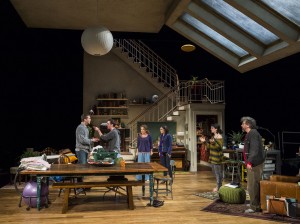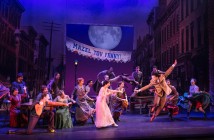TRIBES
About six months ago, when I was having lunch in West Hollywood with Mare Winningham, an actress I’ve long admired, she told me of the off-Broadway show whose run she had just finished. She made it sound so lovely, (as she seems to do for everything,) that she made me want to see it.
Well, I got that chance on Sunday night when Tribes opened at the Mark Taper Forum, albeit without Mare. But I wish she was the one writing this review because she had a much better understanding of it than I, even though I totally recognize its merit.
This was a well-done production, all the way around, despite the fact that I was often lost. I don’t know if that was because we were sitting too far back to comfortably make out all the words, or as my friend contends, they mumbled a lot of lines on purpose to give us all just a little taste of what the two main characters were going through.
It’s a play about a dysfunctional family with one deaf son, but how his deafness is treated is the main topic. [Note: My theatre companion asked me if it was politically correct to say “deaf” rather than “hearing-impaired,” so I did research on the subject, and the community members themselves use “deaf,” so I will, too.] It was very enlightening, especially after much post-show reflection, which is when I do my best thinking.
It’s basically a thesis about how to bring up a deaf child, using sign language versus just teaching them to lip-read, and I found that topic to be interesting, educational, worthwhile, and thought provoking. It’s a very under-explored topic in the arts, and any way it can be brought to the masses is fine with me.
But, they lost me several times along the journey, and I don’t know what the end showed us. (Nor did any of the other first nighters I spoke with after.) I felt it just sort-of petered-out, with no real resolution to their issues. And having the other son seem to go crazy along the way was just distracting. I didn’t know whose problems to pay attention to! It was like watching a movie with Mr. X, who, being a writer himself on occasion, is always trying to guess where the story is going, so the whole thing becomes confusing. (He’s usually wrong, by the way, but his ideas turn-out to be more interesting than what really happens in the films.)
I could explain this play in intellectual terms of all of our need to be heard, etc. But you know I like to review these things in layman’s terms, revealing mainly if I had a good or worthwhile time seeing it. Especially in light of last week’s horrible Valerie Harper news, (which I’ll try to explore later on this week,) I feel even more that I don’t want to waste time. And I didn’t here, so I’m good.
The action takes place mainly in the home of Billy, who is deaf from birth. He wears hearing aids, which seem to help a little, and is a proficient lip-reader, even from the side. Especially in the chaotic opening scene, he seems to say very little, more noticeable amidst the four other rabid talkers, (often over each other,) and when he does talk, he sounds “normal.” So, for the first ten minutes or so, I had no idea what the play was about. It appeared to me that it was just about this family, and I couldn’t divine where it would be going. (I don’t read about shows before I see them because I don’t want to go in with any pre-conceived notions, even though it would often help me to know what’s going on.)
But then he meets a girl who’s going deaf, and the play takes off from there. The love story could be happening in any family, with the various reactions to a stranger being introduced into the life of the sheltered one, and I think that everyone can relate to that aspect of the script. What makes Tribes special is the deaf aspect.
A couple of things about the show were confusing, though. I don’t know why the family is English, except for that the play was written by an Englishwoman and was first done in London. (It would have been easy enough to change them into a family from anywhere in the U.S.) Or why they’re Jewish, a fact that is mentioned but once. Neither situation is necessary. And the English accents make it much harder to understand them. We were confused as to why the rest of the family has English accents, but the hearing-impaired son doesn’t. We kept wondering if that’s part of being deaf—if you can’t really hear, but can speak, how do you get a specific accent? I think I spent too much pondering that question during the show, and I was hoping it would be answered by the end, but, alas, it wasn’t.
Being as shallow as I often am, I’m always happy to have a cute guy to look at, and tall drink of water Russell Harvard, who also played the part of Billy in New York, filled that bill. He was facing in my direction for the long first scene, (the Taper audience is in a three-quarter wrap-around configuration, so that isn’t always the case,) so I got to look at him a lot, and ascertain that he’s adorable. Have I mentioned that I’m shallow?
Another positive is that when the two main characters, who are hearing-impaired, (he’s deaf and she’s going deaf,) speak to each other in sign language, the words are projected in an unobtrusive yet easy-to-read way on various parts of the set. That was great. It always takes away from the action (in any medium,) when the hearing characters have to say both lines, which I don’t think is realistic. (But take note: that makes for not a lot of opportunities for coughing or whispering to your pal, so please make sure to curtail those activities!)
I was also a fan of the very real set, designed by Scott Pask, and the undesigned-looking design of the wardrobe by Tristan Raines. The costumes almost looked like the cast was told to just wear their own knock-around clothing, which was perfect.
I hope you all see Tribes for yourselves, and then I beg of you to explain the ending to me. As much as I appreciate the thoughtfulness of the topic, I always like to know how it’s all resolved, which is something I missed here.
Tribes running through April 14, 2013
Mark Taper Forum 135 N. Grand Ave. 213-628-2772 www.CenterTheatreGroup.org




